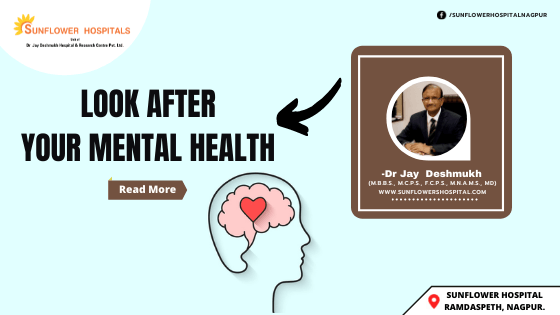What is the incidence of mental illnesses?
The incidence is increasing worldwide. There has been a 13% rise in mental health conditions in the last decade. About 20% of the world’s children and adolescents have a mental condition, with suicide being a leading cause of death. Mental health conditions can have a substantial effect in all areas of life, such as school or work performance, relationships with family and friends and the ability to participate in the community. The two most common conditions are anxiety and depression. In most cases, the symptoms can be managed by a combination of medications and psychotherapy.
What are the main symptoms of mental illnesses?
Mental symptoms can affect thoughts, emotions, and behaviours. The symptoms can differ depending on the diagnosis. However, if you feel sad or have confused thinking or reduced ability to concentrate, think about mental illness as a possibility Excessive fears or worries, or extreme feelings of guilt, mood swings, withdrawal from friends and activities may require a doctor’s attention. Significant tiredness, low energy or problems in sleeping are important symptoms. Suicidal thinking, excessive anger, hostility or violence are signs of mental illness. Detachment from reality, paranoia, or hallucinations, inability to cope with daily issues or stress, major changes in eating habits and change in sex drive needs attention from a psychiatrist. Trouble in relating to people and situations and issues with alcohol or drug use can be significant symptoms of underlying mental illness. Your life situation may trigger it if you are genetically predisposed. Exposure to environmental stressors, inflammatory conditions, toxins, alcohol, or drugs while in the womb can be linked to mental illness. Brain chemicals known as neurotransmitters carry signals to other parts of the body and the brain. Depression and emotional disorders are caused by a disruption in the neural networks due to changes in neurotransmitters.
How to prevent your mental health from becoming unhealthy?
There is no sure way to prevent mental illness. However, if you have a mental illness, taking steps to control stress, increase your resilience
term medical treatment may prevent a recurrence. Sufficient sleep, healthy eating and regular physical activity are important Always be in touch with your psychiatrist in case you have noticed a change in your behaviour. If untreated, what are the complications of mental illness? Mental illness is a leading cause of disability Untreated mental illness can cause severe emotional, behavioural and physical health problems. This may include unhappiness and decreased enjoyment of life. Family conflicts, relationship difficulties, social isolation, issues with tobacco, alcohol and other drugs, issues related to working or school, Generally, we all are aware of our physical health. We look after our weight, exercise protocol, blood pressure, diabetes care and fevers. However, mental health is a major concern worldwide. Mental health is included with Sustainable Development Goals. Depression is one of the leading causes of disability. Suicide is the second leading cause of death among 15-29 years old. People with severe mental health conditions die prematurely almost two decades early due to preventable physical conditions.
Can mental health appear as a physical difficulty?
Certain symptoms like stomach pain, headaches, or other unexplained aches and pains could be due to underlying mental disorders.
What causes mental disorders? Mental illnesses are thought to be caused by a variety of genetic and environmental factors. Mental illness is more common in blood relatives who have mental
and boosting your self-esteem may keep your symptoms under control. Pay attention to warning signals. Understand your triggering factors. Contact your doctor or therapist. Consider involving your family members or friends to watch for warning signs. Get routine medical care to see the effects and side effects of the drugs prescribed. Mental health conditions can be harder to treat if you wait till symptoms get bad. Long legal and financial issues are common. Self-harm and harm to others that may include suicide or homicide, weakened immune system, heart disease and other medical conditions may be due to mental illnesses.
What are the different mental illnesses?
Certain neurodevelopmental disorders like autism, attention deficit, hyperactivity disorder, schizophrenia spectrum and other psychotic disorders are included in mental disorders. Bipolar disorders include alternating episodes of mania. Periods of excessive activity, energy, and excitement followed by depression. Depressive disorders and anxiety disorders are very common. Preoccupation with repetitive thoughts or actions is known as obsessive-compulsive disorder. This includes repetitive handwashing, checking if the doors are blocked repeatedly. Post-traumatic stress disorders, somatic-form disorders, feeding and eating disorders are other mental illnesses.
What are the key facts about depression?
Depression is a common mental disorder. It is estimated that 5% of adults suffer from depression. It is also a leading cause of disability, and more women are depressed than men. Depression can lead to suicide. There is a very effective treatment for mild, moderate and severe depression. Mental illness in India is still not accepted by society at large. It carries a social stigma and patients are generally not well accepted in the mainstream. It is still an unacceptable disease in the mindset of most people. People with mental illness. Ness do not seek timely help from the Psychiatrist due to social taboo attached to mental illnesses. If you have any symptoms suggestive of mental illness, please take timely help from qualified Psychiatrists. Do not delay as it may harm you and your family. Treat and accept mental illness as you would accept any other illnesses like Diabetes or Hypertension.
Author: Dr Jay Deshmukh
Dr Jay Deshmukh is Chief Physician and Director, Sunflower Hospital, Nagpur Honorary Physician to Honorable Governor of Maharashtra and PondicherryCentral. Dr Jay Deshmukh is an M.B.B.S., M.C.P.S., F.C.P.S., M.N.A.M.S., MD From Internal Medicine – Bombay and New Delhi.


